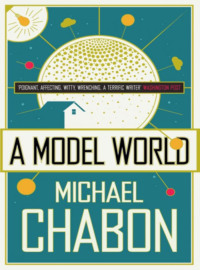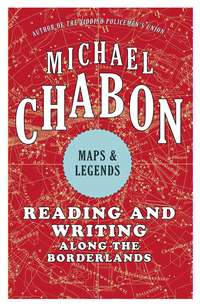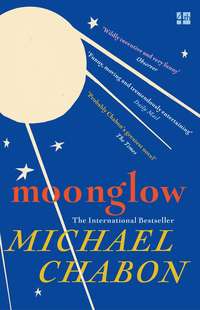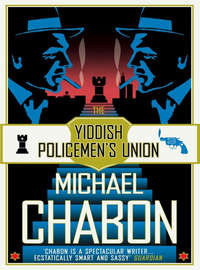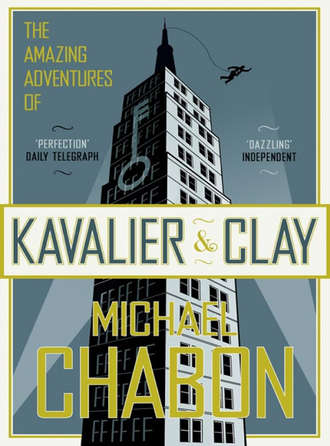
Полная версия
The Amazing Adventures of Kavalier and Clay
“We both are,” said Sammy. “Artists, I mean.” He decided to match Anapol’s dubiety with a burst of self-confidence he was rapidly inducing himself to feel. He went over to the partition and rapped, with a flourish, on the glass. Joe turned, startled, from his work. Sammy, not wanting to endanger his own display of confidence, didn’t let himself look too closely at what Joe had done. At least the whole page seemed to have been filled in.
“May I—?” he said to Anapol, gesturing toward the door.
“Might as well get him in here.”
Sammy signaled for Joe to come in, a ringmaster welcoming a famous aerialist into the spotlight. Joe stood up, gathering the portfolio and his stray pencils, then sidled into Anapol’s office, sketchpad clutched to his chest, in his baggy tweed suit, with his hungry face and borrowed tie, his expression at once guarded and touchingly eager to please. He was looking at the owner of Empire Novelty as if all the big money Sammy had promised had been packed into the swollen carapace of Sheldon Anapol and would, at the slightest prick or tap, come pouring out in an uncontrollable green torrent.
“Hello, young man,” said Anapol. “I’m told you can draw.”
“Yes, sir!” Joe said, in a voice that sounded oddly strangled, startling them all.
“Give it here.” Sammy reached for the pad and found, to his surprise, that he couldn’t pry it loose. For an instant, he was afraid that his cousin had done something so abominable that he was afraid to show it. Then he caught a glimpse of the upper left corner of Joe’s drawing, where a fat moon peered from behind a crooked tower, a crooked bat flapping across its face, and he saw that, on the contrary, his cousin simply couldn’t let go.
“Joe,” he said softly.
“I need a little more time with it,” Joe said, handing the pad to Sammy.
Anapol came around from behind his desk, lodged the burning cigarette in a corner of his mouth, and took the pad from Sammy. “Look at that!” he said.
In the drawing it was midnight, in a cobblestone alley crosshatched with menacing shadows. There were evocative suggestions of tiled roofs, leaded windows, icy puddles on the ground. Out of the shadows and into the light of the bat-scarred moon strode a tall, brawny man. His frame was as sturdy and thick as his hobnailed boots. For costume he wore a tunic with deep creases, a heavy belt, and a big, shapeless stocking hat like something out of Rembrandt. The man’s features, though regular and handsome, looked frozen, and his intrepid gaze was empty. There were four Hebrew characters etched into his forehead.
“Is that the Golem?” said Anapol. “My new Superman is the Golem?”
“I didn’t—the conceit is new for me,” Joe said, his English stiffening up on him. “I just drawed the first thing I could think of that resembled … To me, this Superman is … maybe … only an American Golem.” He looked for support to Sammy. “Is that right?”
“Huh?” said Sammy, struggling to conceal his dismay. “Yeah, sure, but, Joe … the Golem is … well … Jewish.”
Anapol rubbed his heavy chin, looking at the drawing. He pointed to the portfolio. “Let me see what else you got in there.”
“He had to leave all his work back in Prague,” Sammy put in quickly, as Joe untied the ribbon of the portfolio. “He just started throwing together some new stuff this morning.”
“Well, he isn’t fast,” Anapol said when he saw that Joe’s portfolio was empty. “He has talent, anyone can see that, but …” The look of doubtfulness returned to his face.
“Joe,” cried Sammy. “Tell him where you studied!”
“The Academy of Fine Art, in Prague,” said Joe.
Anapol stopped rubbing his chin. “The Academy of Fine Art?”
“What is that? Who are these guys? What’s going on in here?” Jack Ashkenazy burst into the office without warning or a knock. He had all his hair, and was a much snappier dresser than his brother-in-law, favoring checked vests and two-tone shoes. Because he had prospered, in a Kramler Building kind of way, more easily than Anapol, he had not been forced to develop the older man’s rumpled salesman’s charm, but he shared Anapol’s avidity for unburdening America’s youth of the oppressive national mantle of tedium, ten cents at a time. He plucked the cigar from his mouth and yanked the sketchpad out of Anapol’s hands.
“Beauteeful,” he said. “The head is too big.”
“The head is too big?” said Anapol. “That’s all you can say?”
“The body’s too heavy. Looks like he’s made out of stone.”
“He is made out of stone, you idiot, he’s a golem.”
“Clay, actually,” said Joe. He coughed. “I can do something more lighter.”
“He can do anything you want,” said Sammy.
“Anything,” Joe agreed. His eyes widened as an inspiration seemed to strike, and he turned to Sammy. “Maybe I ought to show them my fart.”
“He’s only ever read one comic book,” Sammy said, ignoring this suggestion. “But I’ve read them all, boss. I’ve read every issue of Action. I’ve studied this stuff. I know how it’s done. Look.” He picked up his own portfolio and untied the strings. It was a cheap pasteboard number from Woolworth’s, like Joe’s, but battered, scraped, and carefully dented. You couldn’t sit around in some art director’s waiting room with a brand-new-looking portfolio. Everyone would know you were a tyro. Sammy had spent an entire afternoon last fall hitting his with a hammer, walking across it in a pair of his mother’s heels, spilling coffee on it. Unfortunately, since purchasing it he had managed to land only two cartoons, one in a completely humor-free magazine called Laff and the other in Belle-Views, house organ of the psychiatric ward where his mother worked.
“I can do it all,” he boasted, pulling out a fistful of sample pages and passing them around. What he meant, more precisely, was that he could steal it all.
“It isn’t half bad,” Anapol said.
“It ain’t beauteeful, either,” said Ashkenazy.
Sammy glared at Ashkenazy, not because Ashkenazy had insulted his work—no one was ever more aware of his own artistic limitations than Sam Clay—but because Sammy felt that he was standing on the border of something wonderful, a land where wild cataracts of money and the racing river of his own imagination would, at last, lift his makeshift little raft and carry it out to the boundless freedom of the open sea. Jack Ashkenazy, whose watery eyes could easily, Sammy imagined, be stabbed out with the letter opener on Anapol’s desk, was threatening to get in his way. Anapol caught the look of visionary murder in Sammy’s eyes and took a chance on it.
“What say we let these boys go home over the weekend and try to come up with a Superman for us.” He fixed Sammy with a hard look. “Our own kind of a Superman, naturally.”
“Of course.”
“How long is a Superman story?”
“Probably twelve pages.”
“I want a character and a twelve-page story by Monday.”
“We’re going to need a lot more than that,” said Ashkenazy. “They got typically five or six characters in there. You know, a spy. A private eye. A shadowy avenger of the helpless. An evil Chinaman. These two can’t come up with all that themselves and draw it. I got artists, Shelly. I got George Deasey.”
“No!” said Sammy. George Deasey was the editor in chief of Racy Publications. He was a tyrannical, ill-tempered old newspaperman who filled the Kramler Building’s elevators with the exacerbated smell of rye. “It’s mine. Ours, me and Joe. Boss, I can handle it.”
“Absolutely, boss,” said Joe.
Anapol grinned. “Get a load of this guy,” he said. “You just get me a Superman,” he went on, putting a placating hand on Sammy’s shoulder. “Then we’ll see about what you can handle or not. All right, Jack?”
Ashkenazy twisted his usually genial features into a grimace. “I have to tell you, Shelly. I got serious doubts. I’m going to have to say—”
“The radios,” Joe said. “The little radios outside.”
“Aw, forget the damn radios, Joe, will you?” Sammy said.
“What, the midgets?” Anapol said.
Joe nodded. “They are just wrong in the wires. All in the same way. One little wire is not, hmm. So.” He kissed the tip of one index finger with the other. “Stuck together to the resistance.”
“You mean to the resistor?”
“Okay.”
“You know from radios?” Anapol narrowed his eyes doubtfully. “You’re saying you could fix them?”
“Oh, assuredly, boss. It is simple to me.”
“How much is it going to cost?”
“Not anything. Some few pence for the—I do not know the word.” He angled his fingers into the form of a pistol. “Weichlöte. You must to melt it.”
“Solder? A soldering gun?”
“Okay. But perhaps I can to borrow that.”
“Just a few pence, huh?”
“Maybe one penny for the radio, each radio.”
“That’s cutting it pretty close to my cost.”
“But okay, I don’t charge to do the work.”
Sammy looked at his cousin, amazed and only a little put out at his having shanghaied the negotiation. He saw Anapol raise a meaningful eyebrow at his brother-in-law, promising or threatening something.
At last Jack Ashkenazy nodded. “There’s just one thing,” he said. He put a hand on Joe’s arm, restraining him before he could sidle out of the office, with his blank-eyed Golem and his empty portfolio. “This is a comic book we’re talking about, okay? Half bad is maybe better than beauteeful.”
3
THE FIRST OFFICIAL MEETING of their partnership was convened outside the Kramler Building, in a nimbus compounded of the boys’ exhalations and of subterranean steam purling up from a grate in the pavement.
“This is good,” Joe said.
“I know.”
“He said yes,” Joe reminded his cousin, who stood patting idly with one hand at the front of his overcoat and a panicked expression on his face, as though worried that he had left something important behind in Anapol’s office.
“Yes, he did. He said yes.”
“Sammy.” Joe reached out and grabbed Sammy’s wandering hand, arresting it in its search of his pockets and collar and tie. “This is good.”
“Yes, this is good, god damn it. I just hope to God we can do it.”
Joe let go of Sammy’s hand, shocked by this expression of sudden doubt. He had been completely taken in by Sammy’s bold application of the Science of Opportunity. The whole morning, the rattling ride through the flickering darkness under the East River, the updraft of Klaxons and rising office blocks that had carried them out of the subway station, the ten thousand men and women who immediately surrounded them, the ringing telephones and gum-snapping chitchat of the clerks and secretaries in Sheldon Anapol’s office, the sly and harried bulk of Anapol himself, the talk of sales figures and competition and cashing in big, all this had conformed so closely to Joe’s movie-derived notions of life in America that if an airplane were now to land on Twenty-fifth Street and disgorge a dozen bathing-suit-clad Fairies of Democracy come to award him the presidency of General Motors, a contract with Warner Bros., and a penthouse on Fifth Avenue with a swimming pool in the living room, he would have greeted this, too, with the same dreamlike unsurprise. It had not occurred to him until now to consider that his cousin’s display of bold entrepreneurial confidence might have been entirely bluff, that it was 8°C and he had neither hat nor gloves, that his stomach was as empty as his billfold, and that he and Sammy were nothing more than a couple of callow young men in thrall to a rash and dubious promise.
“But I have belief in you,” Joe said. “I trust you.”
“That’s good to hear.”
“I mean it.”
“I wish I knew why.”
“Because,” said Joe. “I don’t have any choice.”
“Oh ho.”
“I need money,” Joe said, and then tried adding, “god damn it.”
“Money.” The word seemed to have a restorative effect on Sammy, snapping him out of his daze. “Right. Okay. First of all, we need horses.”
“Horses?”
“Arms. Guys.”
“Artists.”
“How about we just call them ‘guys’ for right now?”
“Do you know where we can find some?”
Sammy thought for a moment. “I believe I do,” he said. “Come on.”
They set off in a direction that Joe decided was probably west. As they walked Sammy seemed to get lost quickly in his own reflections. Joe tried to imagine the train of his cousin’s thoughts, but the particulars of the task at hand were not clear to him, and after a while he gave up and just kept pace. Sammy’s gait was deliberate and crooked, and Joe found it a challenge to keep from getting ahead. There was a humming sound everywhere that he attributed first to the circulation of his own blood in his ears before he realized that it was the sound produced by Twenty-fifth Street itself, by a hundred sewing machines in a sweatshop overhead, exhaust grilles at the back of a warehouse, the trains rolling deep beneath the black surface of the street. Joe gave up trying to think like, trust, or believe in his cousin and just walked, head abuzz, toward the Hudson River, stunned by the novelty of exile.
“Who is he?” Sammy said at last, as they were crossing a broad street which a sign identified, improbably somehow, as Sixth Avenue. Sixth Avenue! The Hudson River!
“Who is he,” Joe said.
“Who is he, and what does he do?”
“He flies.”
Sammy shook his head. “Superman flies.”
“So ours does not?”
“I just think I’d …”
“To be original.”
“If we can. Try to do it without flying, at least. No flying, no strength of a hundred men, no bulletproof skin.”
“Okay,” Joe said. The humming seemed to recede a little. “And some others, they do what?”
“Well, Batman—”
“He flies, like a bat.”
“No, he doesn’t fly.”
“But he is blind.”
“No, he only dresses like a bat. He has no batlike qualities at all. He uses his fists.”
“That sounds dull.”
“Actually, it’s spooky. You’d like it.”
“Maybe another animal.”
“Uh, well, yeah. Okay. A hawk. Hawkman.”
“Hawk, yes, okay. But that one must fly.”
“Yeah, you’re right. Scratch the bird family. The, uh, the Fox. The Shark.”
“A swimming one.”
“Maybe a swimming one. Actually, no, I know a guy works in the Chesler shop, he said they’re already doing a guy who swims. For Timely.”
“A lion?”
“Lion. The Lion. Lionman.”
“He could be strong. He roars very loud.”
“He has a super roar.”
“It strikes fear.”
“It breaks dishes.”
“The bad guys go deaf.”
They laughed. Joe stopped laughing.
“I think we have to be serious,” he said.
“You’re right,” said Sammy. “The Lion, I don’t know. Lions are lazy. How about the Tiger. Tigerman. No, no. Tigers are killers. Shit. Let’s see.”
They began to go through the rolls of the animal kingdom, concentrating naturally on the predators: Catman, Wolfman, the Owl, the Panther, the Black Bear. They considered the primates: the Monkey, Gorillaman, the Gibbon, the Ape, the Mandrill with his multicolored wonder ass that he used to bedazzle opponents.
“Be serious,” Joe chided again.
“I’m sorry, I’m sorry. Look, forget animals. Everybody’s going to be thinking of animals. In two months, I’m telling you, by the time our guy hits the stands, there’s going to be guys running around dressed like every damn animal in the zoo. Birds. Bugs. Underwater guys. And I’ll bet you anything there’s going to be five guys who are really strong, and invulnerable, and can fly.”
“If he goes as fast as the light,” Joe suggested.
“Yeah, I guess it’s good to be fast.”
“Or if he can make a thing burn up. If he can—listen! If he can, you know. Shoot the fire, with his eyes!”
“His eyeballs would melt.”
“Then with his hands. Or, yes, he turns into a fire!”
“Timely’s doing that already, too. They got the fire guy and the water guy.”
“He turns into ice. He makes the ice everywhere.”
“Crushed or cubes?”
“Not good?”
Sammy shook his head. “Ice,” he said. “I don’t see a lot of stories in ice.”
“He turns into electricity?” Joe tried. “He turns into acid?”
“He turns into gravy. He turns into an enormous hat. Look, stop. Stop. Just stop.”
They stopped in the middle of the sidewalk, between Sixth and Seventh avenues, and that was when Sam Clay experienced a moment of global vision, one which he would afterward come to view as the one undeniable brush against the diaphanous, dollar-colored hem of the Angel of New York to be vouchsafed to him in his lifetime.
“This is not the question,” he said. “If he’s like a cat or a spider or a fucking wolverine, if he’s huge, if he’s tiny, if he can shoot flames or ice or death rays or Vat 69, if he turns into fire or water or stone or India rubber. He could be a Martian, he could be a ghost, he could be a god or a demon or a wizard or monster. Okay? It doesn’t matter, because right now, see, at this very moment, we have a bandwagon rolling, I’m telling you. Every little skinny guy like me in New York who believes there’s life on Alpha Centauri and got the shit kicked out of him in school and can smell a dollar is out there right this minute trying to jump onto it, walking around with a pencil in his shirt pocket, saying, ‘He’s like a falcon, no, he’s like a tornado, no, he’s like a goddamned wiener dog.’ Okay?”
“Okay.”
“And no matter what we come up with, and how we dress him, some other character with the same shtick, with the same style of boots and the same little doodad on his chest, is already out there, or is coming out tomorrow, or is going to be knocked off from our guy inside a week and a half.”
Joe listened patiently, awaiting the point of this peroration, but Sammy seemed to have lost the thread. Joe followed his cousin’s gaze along the sidewalk but saw only a pair of what looked to be British sailors lighting their cigarettes off a single shielded match.
“So …” Sammy said. “So …”
“So that is not the question,” Joe prompted.
“That’s what I’m saying.”
“Continue.”
They kept walking.
“How? is not the question. What? is not the question,” Sammy said.
“The question is why.”
“The question is why.”
“Why,” Joe repeated.
“Why is he doing it?”
“Doing what?”
“Dressing up like a monkey or an ice cube or a can of fucking corn.”
“To fight the crime, isn’t it?”
“Well, yes, to fight crime. To fight evil. But that’s all any of these guys are doing. That’s as far as they ever go. They just … you know, it’s the right thing to do, so they do it. How interesting is that?”
“I see.”
“Only Batman, you know … see, yeah, that’s good. That’s what makes Batman good, and not dull at all, even though he’s just a guy who dresses up like a bat and beats people up.”
“What is the reason for Batman? The why?”
“His parents were killed, see? In cold blood. Right in front of his eyes, when he was a kid. By a robber.”
“It’s revenge.”
“That’s interesting,” Sammy said. “See?”
“And he was driven mad.”
“Well …”
“And that’s why he puts on the bat’s clothes.”
“Actually, they don’t go so far as to say that,” Sammy said. “But I guess it’s there between the lines.”
“So, we need to figure out what is the why.”
“‘What is the why,’” Sammy agreed.
“Flattop.”
Joe looked up and saw a young man standing in front of them. He was short-waisted and plump, and his face, except for a pair of big black spectacles, was swaddled and all but invisible in an elaborate confection of scarf and hat and earflaps.
“Julius,” Sammy said. “This is Joe. Joe, this is a friend from the neighborhood, Julie Glovsky.”
Joe held out his hand. Julie studied it a moment, then extended his own small hand. He had on a black woolen greatcoat, a fur-lined leather cap with mammoth earflaps, and too-short green corduroy trousers.
“This guy’s brother is the one I told you about,” Sammy told Joe. “Making good money in comics. What are you doing here?”
Somewhere deep within his wrappings, Julie Glovsky shrugged. “I need to see my brother.”
“Isn’t that remarkable, we need to see him, too.”
“Yeah? Why’s that?” Julie Glovsky shuddered. “Only tell me fast before my nuts fall off.”
“Would that be from cold or, you know, atrophy?”
“Funny.”
“I am funny.”
“Unfortunately not in the sense of ‘humorous.’”
“Funny,” Sammy said.
“I am funny. What’s your idea?”
“Why don’t you come to work for me?”
“For you? Doing what? Selling shoestrings? We still got a box of them at my house. My mom uses them to sew up chickens.”
“Not shoelaces. My boss, you know, Sheldon Anapol?”
“How would I know him?”
“Nevertheless, he is my boss. He’s going into business with his brother-in-law, Jack Ashkenazy, who you also do not know, but who publishes Racy Science, Racy Combat, et cetera. They’re going to do comic books, see, and they’re looking for talent.”
“What?” Julie poked his tortoise face out from the shadows of its woolen shell. “Do you think they might hire me?”
“They will if I tell them to,” said Sammy. “Seeing as how I’m the art director in chief.”
Joe looked at Sammy and raised an eyebrow. Sammy shrugged.
“Joe and I, here, we’re putting together the first title right now. It’s going to be all adventure heroes. All in costumes,” he said, extemporizing now. “You know, like Superman. Batman. The Blue Beetle. That type of thing.”
“Tights, like.”
“That’s it. Tights. Masks. Big muscles. It’s going to be called Masked Man Comics,” he continued. “Joe and I’ve got the lead feature all taken care of, but we need backup stuff. Think you could come up with something?”
“Shit, Flattop, yes. You bet.”
“What about your brother?”
“Sure, he’s always looking for more work. They got him doing Romeo Rabbit for thirty dollars a week.”
“Okay, then, he’s hired, too. You’re both hired, on one condition.”
“What’s that?”
“We need a place to work,” said Sammy.
“Come on then,” said Julie. “I guess we can work at the Rathole.” He leaned toward Sammy as they started off, lowering his voice. The tall skinny kid with the big nose had fallen a few steps behind them to light a cigarette. “Who the hell is that guy?”
“This?” Sammy said. He took hold of the kid’s elbow and tugged him forward as though bringing him out onstage to take a deserved bow. He reached up to grab a handful of the kid’s hair and gave it a tug, just kind of rocking his head from side to side while holding on to his hair, grinning at him. Had Joe been a young woman, Julie Glovsky might almost have been inclined to think that Sammy was sweet on her. “This is my partner.”
4
SAMMY WAS THIRTEEN when his father, the Mighty Molecule, came home. The Wertz vaudeville circuit had folded that spring, a victim of Hollywood, the Depression, mismanagement, bad weather, shoddy talent, philistinism, and a number of other scourges and furies whose names Sammy’s father would invoke, with incantatory rage, in the course of the long walks they took together that summer. At one time or another he assigned blame for his sudden joblessness, with no great coherence or logic, to bankers, unions, bosses, Clark Gable, Catholics, Protestants, theater owners, sister acts, poodle acts, monkey acts, Irish tenors, English Canadians, French Canadians, and Mr. Hugo Wertz himself.
“Hell with ’em,” he would invariably finish, with a sweeping gesture that, in the dusk of a Brooklyn July, was limned by the luminous arc of his cigar. “The Molecule one day says ‘fuck you’ to the all of them.”
The free and careless use of obscenity, like the cigars, the lyrical rage, the fondness for explosive gestures, the bad grammar, and the habit of referring to himself in the third person were wonderful to Sammy; until that summer of 1935, he had possessed few memories or distinct impressions of his father. And any of the above qualities (among several others his father possessed) would, Sammy thought, have given his mother reason enough to banish the Molecule from their home for a dozen years. It was only with the greatest reluctance and the direct intervention of Rabbi Baitz that she had agreed to let the man back in the house. And yet Sammy understood, from the moment of his father’s reappearance, that only dire necessity could ever have induced the Genius of Physical Culture to return to his wife and child. For the last dozen years he had wandered, “free as a goddamn bird in the bush,” among the mysterious northern towns of the Wertz circuit, from Augusta, Maine, to Vancouver, British Columbia. An almost pathological antsiness, combined with the air of wistful longing that filled the Molecule’s simian face, petite and intelligent, when he spoke of his time on the road, made it clear to his son that as soon as the opportunity presented itself, he would be on his way again.


